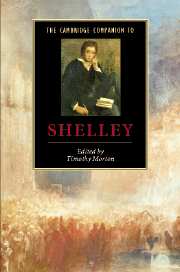3 - The lyricist
from Part II - Works
Published online by Cambridge University Press: 28 January 2007
Summary
In a compelling and enduringly fascinating article of 1954, Frederick Pottle issued a polemic entitled 'The Case of Shelley'. Situating himself against the prevailing - and very modernist - New Critical dogma that Percy Shelley exhibits dissociation of sensibility, incoherent image patterns, and sundry other offences against early 'formalist' creeds, Pottle insisted that Shelley is (as he unabashedly put it) 'a great poet'. He sought to augment his claim by insisting that, contrary to the charges of effeminacy rampant among anti- Shelleyans, he found Shelley to be indeed 'manly'. But he also offered a strange prediction, and we had best check our smugness before simply dismissing it, for the quixotic reputation of Shelley is one of the more eccentric phenomena of literary history: he goes on in the essay to lament that 'It is clear to me that within fifty years practically everybody will be saying about Shelley what the New Critics are saying now. The disesteem of Shelley is going to become general, and it may continue for a century or more' (374).
Pottle's poignancy provides a good index of the histrionics that have accompanied the reputation of Shelley, a histrionics that seems in fact to rely on a reading specifically of Shelleyan lyric for its force. Those critics complaining about Shelley's effeminacy, or immaturity, or political naivety, seem to be reacting to an alluring and virtuosic lyric fluency that is socially motivated even as it is self-effacing, politically charged even as it is directed to cognoscenti, and deeply expressive even as it is insistently aware of its linguistic inefficacies. It has been a good deal less than a century since Pottle first offered his sad prognosis, and the esteem of Shelley, and especially of Shelleyan lyric, has already climbed to (and again somewhat receded from) staggering heights of approbation. When post-structuralism took the paradigm-baton from New Criticism, the effacements and self-subversions inherent in Shelleyan lyric became signatures of sophistication, not, as T. S. Eliot derisively labelled them in 1933, the signs ‘of adolescence’. In 1936, F. R. Leavis notoriously complained that Shelley has a ‘weak grasp upon the actual’, and in fact Pottle believed that the judgement of Leavis, or someone like him, would probably define the century’s general evaluation of Shelley.
- Type
- Chapter
- Information
- The Cambridge Companion to Shelley , pp. 45 - 64Publisher: Cambridge University PressPrint publication year: 2006
- 4
- Cited by

